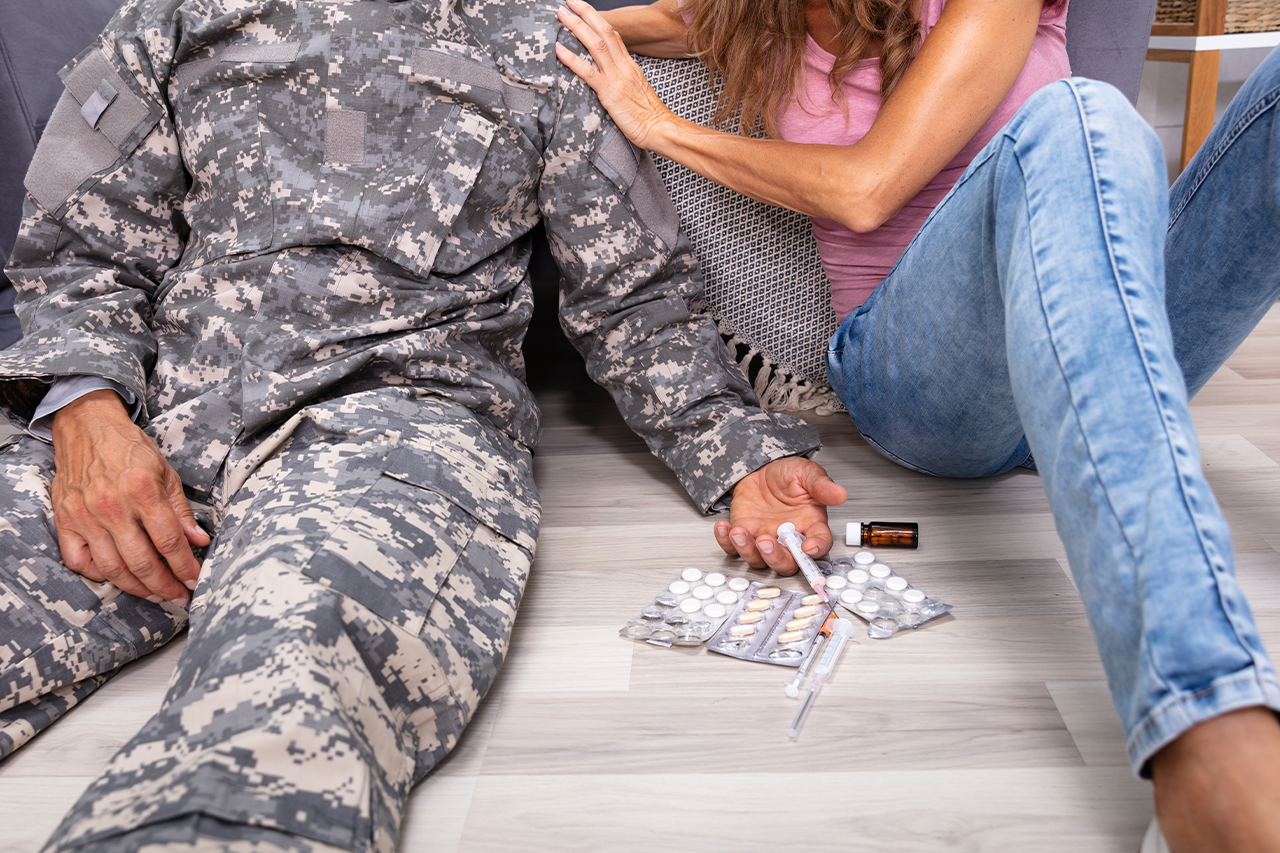
Opioid Treatment for Veterans & Military
A pressing concern for veterans and military service members is opioid addiction, which requires specialized and comprehensive treatment. Banyan Treatment Centers offers a Military and Veterans in Recovery program that plays a pivotal role in providing tailored and professional care to address this crisis. We aim to address the opioid crisis within this community by addressing physical and emotional needs, offering relapse prevention strategies, and providing ongoing support. Below is more on our evidence-based strategies and unique considerations offered in our opioid treatment for veterans and service members.

Opiate Addiction in Veterans & Military Members
There’s a complex relationship between veterans and opioid addiction. According to the Department of Veterans Affairs (VA), around 65% of veterans suffer from chronic pain, making them twice as likely to die from an accidental prescription opioid overdose as non-veterans.1 What’s more, active-duty personnel and veterans are more likely to experience chronic pain caused by combat-related injuries, and they are more likely to be prescribed and eventually abuse narcotics.
Many veterans also suffer from such mental health disorders as post-traumatic stress disorder (PTSD) and depression, making them more likely to turn to drugs like opioids as a form of self-medication. As such, opioid use among veterans is a critical concern in the healthcare community. Veterans are at an increased risk of opioid use due to various factors, including the management of chronic pain resulting from service-related injuries or post-traumatic stress disorder (PTSD).
Common causes and contributing factors to veterans and opioid addiction include:
- Pain management: Chronic pain resulting from combat injuries or other service-related ailments may lead to the prescription of opiates for pain management. Prolonged use can increase the risk of addiction.
- Deployment, combat, and trauma: Military personnel often face traumatic events during deployment, which can lead to mental health issues such as post-traumatic stress disorder (PTSD). Some may turn to opiates as a means of self-medication to cope with the emotional pain.
- Accessibility: In some cases, veterans and military members may have easier access to prescription opiates due to their healthcare benefits, making it more likely for them to be exposed to these drugs.
- Peer pressure: Within the military culture, there may be instances of peer influence, where individuals use opiates recreationally or to cope with stress, leading others to do the same.
- Mental health issues: Co-occurring mental health disorders, such as depression, anxiety, or PTSD, are common in this population. Opiates may be used as a form of self-medication to alleviate symptoms.
- Stigma and fear of seeking help: There can be a stigma associated with seeking help for mental health or addiction issues in the military. Fear of career consequences can deter individuals from getting the assistance they need.
- Over-prescription: Sometimes, the over-prescription of opiates by military healthcare providers can inadvertently contribute to addiction issues.
- Family and social support: The presence or absence of a support system at home can play a significant role. A lack of familial or social support may increase the risk of addiction.
- Demographic factors: Factors such as age, gender, and length of service can influence the likelihood of developing opiate addiction.
Understanding these causes of military and veterans’ opioid use disorder is critical for developing effective prevention and treatment strategies. Treatment often requires a multi-faceted approach that includes pain management alternatives, improved mental health services, reducing stigma, and enhancing education on the risks associated with opiates. This level of care is offered at our nationwide military rehab centers.
Signs of Opioid Addiction
Opioids are addictive because they bind to mu-opioid receptors in the brain and nervous system, which are responsible for pain relief and pleasure. These receptors are found throughout the body, including the brain, spinal cord, and digestive tract.
When opioids attach themselves to opioid receptors, they trigger the release of dopamine, a neurotransmitter associated with pleasure, reward, and motivation. This flood of dopamine creates an intense sensation of euphoria, relaxation, and a feeling of well-being, which can be highly addictive.
Over time, the brain becomes tolerant to the side effects of opioids, meaning that higher doses are required for the user to experience the same effects. Additionally, opioids can cause physical dependence, which is when the body adapts to the presence of a substance and exhibits withdrawal symptoms when the use of the drug is cut down or stopped.
If you suspect that a loved one is addicted to narcotics, look out for these signs of opioid abuse:
- Behavioral changes: People who are addicted to opioids may exhibit changes in their behavior, such as secrecy, mood swings, erratic behavior, and isolation from loved ones.
- Continued use despite any negative repercussions: People addicted to opioids may continue to use these drugs despite any negative consequences, such as losing their jobs, damaging their relationships, or experiencing legal problems.
- Cravings: Opioid abuse can lead to strong drug cravings, which can interfere with daily life and make quitting difficult.
- Physical symptoms: Opioid abuse can cause a variety of physical symptoms, such as constipation, nausea, vomiting, and drowsiness.
- Social withdrawal: People who are addicted to opioids may begin to withdraw from social activities and loved ones and spend more time alone.
- Tolerance: Over time, people who misuse opioids may develop a tolerance to them, meaning they need to take more of the drug to achieve the same euphoric effect or high.
- Withdrawal symptoms: When people addicted to opioids suddenly stop using these drugs or cut back on their use, they may experience withdrawal symptoms like anxiety, insomnia, and flu-like symptoms.
The combination of tolerance, dependence, and the powerful euphoric effects of opioids make them highly addictive drugs. Long-term use can lead to a cycle of drug-taking behavior that can be difficult to break without support. Fortunately, Banyan’s opioid rehab centers for veterans offer physical and psychological care to help retired service members achieve long-term sobriety.
Banyan’s Opioid Treatment for Veterans
Our opioid addiction rehab is offered on various levels of care, including inpatient treatment, intensive outpatient programming, and partial hospitalization. Residential rehab for opioid use is best suited for individuals with severe drug use disorders who require medically assisted detox, stabilization, and 24-hour supervision and support.
Our partial hospitalization program (PHP) is a step down from inpatient care, offering some level of medical support while allowing patients to return home after sessions and perform daily routines outside of rehab. Our intensive outpatient program (IOP) and outpatient treatment are both levels of care that allow patients more flexibility, allowing them to return home every night after their counseling sessions, work, and/or school. Outpatient addiction services are best suited for individuals who are medically stable and do not require round-the-clock care.
Our opioid addiction treatment for veterans and military incorporates physical treatment and psychotherapy services like:
- Accelerated Resolution Therapy (ART)
- Cognitive Behavioral Therapy (CBT)
- Dialectical Behavior Therapy (DBT)
- Dual Diagnosis Treatment
- Eye Movement Desensitization and Reprocessing (EMDR)
- Family Counseling
- Group Counseling and Therapy
- Individual Counseling and Therapy
- Medically Supervised Detox
- Motivational Interviewing (MI)
- Rapid Resolution Therapy (RRT)
- Trauma Therapy
In addition to our addiction rehab for veterans and active duty, select Banyan facilities also offer mental health care for disorders such as PTSD and depression, as well as dual diagnosis treatment for individuals struggling with addiction and mental illness. The specialists at our Banyan rehab locations are here to help clients achieve long-lasting sobriety and control over their lives again.
Finding Opioid Rehab Near Me
It’s important to remember that recovering from opioid abuse and addiction takes time and commitment. Fortunately, you or someone you care about can recover with the help of our effective and compassionate opioid rehab for veterans and active-duty personnel.
Contact Banyan Treatment Centers today to verify your insurance for rehab and learn more about our Military and Veterans in Recovery program.
Source:




